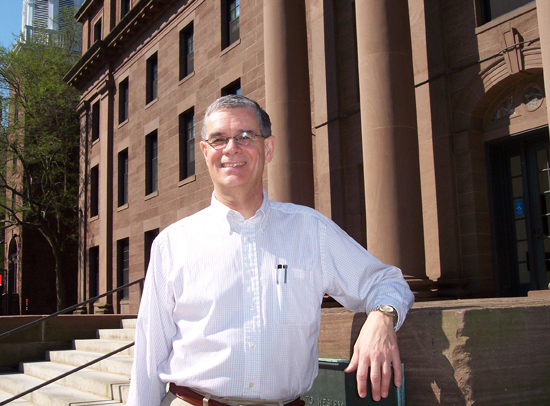Director of Administrative Applications Makes Systems More Efficient for Users
 |
| Ed Below, director of Administrative Applications helped develop systems on the electronic portfolio. |
| Posted 05/02/05 |
|
Q: When did you come to Wesleyan? A: I came to Wesleyan in 1987 as the director of Financial Aid. In 1998, I became the project manager for the PeopleSoft Student Administration System, and later the director of administrative applications. It was a new position. Q: What does it mean to be director of administrative applications? A: I have overall responsibility for how the Student Administration System (SFIS) and the Human Resources Management System (HRMS) are used by the functional offices around campus. My job is to develop better and more efficient ways to use systems in office operations. Q: What is your interaction or overlap with Information Technology Services and Human Resources, or other departments of note? A: ITS has responsibility for all the technical aspects of the systems, but I work with offices to make this technology more efficient. We work closely with ITS to help us implement the system improvements for the offices that use the PeopleSoft systems. In addition to my work with various student services office, I also work with with Human Resources, the Financial Planning Office, Payroll, Academic Affairs and other offices that use the HRMS side of the system. All of our projects are done cooperatively with ITS and the user office that will use the enhancement. Q: What are some examples of projects that have extended the efficiency of these systems? A: One is the InfiNet Web payment system for the Students Accounts Office, GLSP and University Relations. A new online-registration system for GLSP went live last week, and we have also developed a new Budget Management and Planning System that allows senior staff areas to see and enter more detailed information about their budgets. An application that will be live this week is a new on-line compensation system where managers can make their recommendations for the July 1 increases for their staff. Q: How did you get into this type of work? A: I have a masters in higher education administration, and I spent 25 years working in financial aid offices at three other institutions. Working in financial aid has given me a good perspective on how other departments operate, so I learned what was needed in administrative systems. I may not know the payroll process or how Human Resources does their budgeting, but I am able to sit down with experts and figure out how to implement a useful system that can make things easier for them. Q: What is your involvement with the electronic portfolio, and how often should people log into the system and why? A: People should log in every day. From this portfolio, you can see your time off or vacation time, change your address, elect health and life insurance, establish retirement funds and see if there are any campus-wide alerts such as snow parking bans. We established this system for faculty and staff in 2003 to save paper and a lot of hassle. No more filling out papers and physically brining them to an office, and no more calling around to change your mailing address. People can submit all this information now on the Web. Also, since you have to sign into your portfolio, we know it is the right person getting into the system. Q: Any upcoming projects? A: Were currently working on making a better system for all hourly employees who have to report time. The one now works, but we can make it better by extending capabilities for online time recording. Were also designing a recruiting module for new employees, so they can submit their applications and resumes online. On the student side, were looking at re-writing the student online registration system. Thats our big project for next year. Q: How do you spend most of your day? A: Im usually going to quite a few meetings or working on plans here at my desk. Im on the phone sometimes, but mostly I work through e-mail communication. Q: What have you liked best about working at Wesleyan? A: I like the variety of people I come in contact with. Ive met many students and staff and faculty and it interests me to see the variety of things people do. I also like the athletic facility and the cultural resources here at Wesleyan. Its a really good atmosphere. Q: What about your job? A: I like that Im always working on something different and that can be very challenging. And its nice to see how something I made improves the way someone else works. Q: Do you have family? A: I am single, but I have two grown children. Molly is a grad student at the University of South Florida in clinical psychology and Kate is a paramedic in Hartford. Shes engaged to be married next summer. Q: What do you do after work? A: I am a singer. Ive been singing about 10 years, three of which have been with the Hartford Chorale. We put on about three to four concerts a year and sing with the Hartford Symphony Orchestra. I also like to see opera in New York City. I play bridge every week and I like to just putter around my house doing small projects. |
| By Olivia Drake, The Wesleyan Connection editor |

